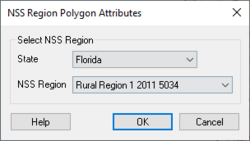WMS:NSS Region Coverage: Difference between revisions
From XMS Wiki
Jump to navigationJump to search
No edit summary |
No edit summary |
||
| (8 intermediate revisions by the same user not shown) | |||
| Line 1: | Line 1: | ||
An NSS Region coverage can be generated so that regions can automatically be mapped to a drainage coverage when performing hydrologic analysis using the NSS regression equations. Individual state maps can be found at the USGS website: http://water.usgs.gov/software/NSS/ (Look at the bottom of the page and select the state). If wanting to digitize the state | An NSS Region coverage can be generated so that regions can automatically be mapped to a drainage coverage when performing hydrologic analysis using the NSS regression equations. Individual state maps can be found at the USGS website: http://water.usgs.gov/software/NSS/ (Look at the bottom of the page and select the state). | ||
If wanting to digitize the state: | |||
#Download the image from the USGS website and save the picture as either a *.tif or *.jpg image (many times the default will be a *.gif image) using any type of imaging software program. | |||
#Load the *.tif, or *.jpg image into WMS and [[Registering an Image|register]] according to the latitude and longitude coordinates found on the map. | |||
#Then [[Coordinate Conversions|convert the coordinates]] to the coordinate system that will be used in delineating the watershed in. | |||
#With the image in the background, digitize the lines and build the polygons of the coverage. | |||
#Finally assign the attributes (state and region) to the polygons and save it as a map file. | |||
This NSS coverage file can then be used for any watershed within the given state. | |||
==NSS Region Polygon Attributes Dialog== | |||
[[File:NSS Region Polygon Attributes.png|thumb|250 px|The ''NSS Region Polygon Attributes'' dialog]] | |||
Selecting a polygon in the NSS Region coverage and the using the ''Feature Objects'' | '''Attributes''' command will bring up the ''NSS Region Polygon Attributes'' dialog. The dialog allows assigning the following: | |||
* ''State'' – Provides a list of U.S. States. | |||
* ''NSS Region'' – Provides a list of available regions based on the state selected above. | |||
For more information on the data available in each NSS region, see the [http://water.usgs.gov/osw/programs/nss/NSSpubs_Rural.html NSS regional documentation]. | |||
==Related Topics== | ==Related Topics== | ||
| Line 12: | Line 28: | ||
[[Category:WMS Coverages|N]] | [[Category:WMS Coverages|N]] | ||
[[Category:External Links]] | [[Category:External Links]] | ||
[[Category:NSS]] | [[Category:NSS|Region]] | ||
[[Category:NSS Dialogs|Region]] | |||
Latest revision as of 15:10, 26 October 2016
An NSS Region coverage can be generated so that regions can automatically be mapped to a drainage coverage when performing hydrologic analysis using the NSS regression equations. Individual state maps can be found at the USGS website: http://water.usgs.gov/software/NSS/ (Look at the bottom of the page and select the state).
If wanting to digitize the state:
- Download the image from the USGS website and save the picture as either a *.tif or *.jpg image (many times the default will be a *.gif image) using any type of imaging software program.
- Load the *.tif, or *.jpg image into WMS and register according to the latitude and longitude coordinates found on the map.
- Then convert the coordinates to the coordinate system that will be used in delineating the watershed in.
- With the image in the background, digitize the lines and build the polygons of the coverage.
- Finally assign the attributes (state and region) to the polygons and save it as a map file.
This NSS coverage file can then be used for any watershed within the given state.
NSS Region Polygon Attributes Dialog
Selecting a polygon in the NSS Region coverage and the using the Feature Objects | Attributes command will bring up the NSS Region Polygon Attributes dialog. The dialog allows assigning the following:
- State – Provides a list of U.S. States.
- NSS Region – Provides a list of available regions based on the state selected above.
For more information on the data available in each NSS region, see the NSS regional documentation.
Related Topics
WMS – Watershed Modeling System | ||
|---|---|---|
| Modules: | Terrain Data • Drainage • Map • Hydrologic Modeling • River • GIS • 2D Grid • 2D Scatter |  |
| Models: | CE-QUAL-W2 • GSSHA • HEC-1 • HEC-HMS • HEC-RAS • HSPF • MODRAT • NSS • OC Hydrograph • OC Rational • Rational • River Tools • Storm Drain • SMPDBK • SWMM • TR-20 • TR-55 | |
| Toolbars: | Modules • Macros • Units • Digitize • Static Tools • Dynamic Tools • Drawing • Get Data Tools | |
| Aquaveo | ||
